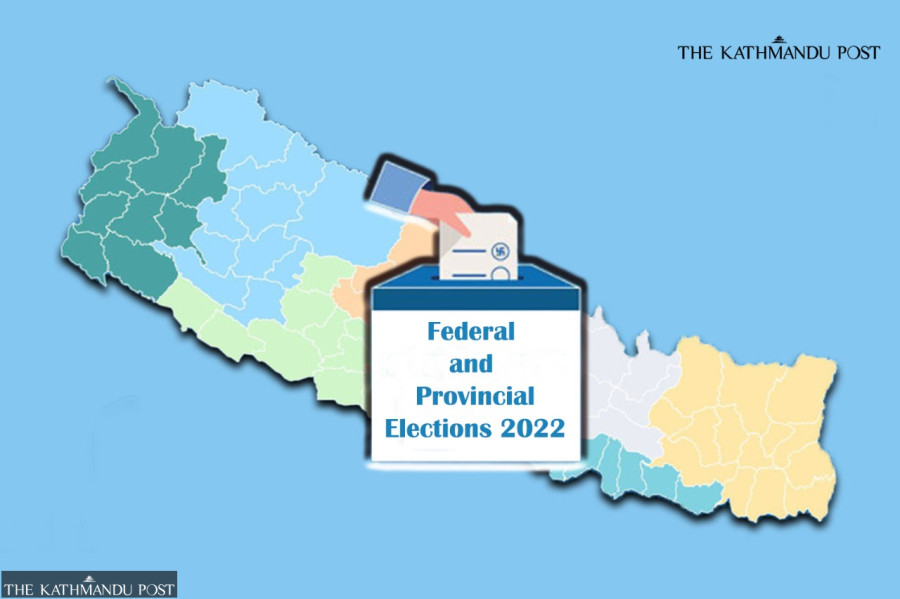National
Congress takes lead in preliminary vote counting
Rastriya Swatantra Party makes an encouraging entry into national politics.
Post Report
Preliminary vote counting across the country showed the Nepali Congress ahead of other major political parties with the CPN-UML following it and previous third largest CPN (Maoist Centre) trailing in a distant third position until late Monday evening.
Vote counting had started from Sunday night in some constituencies. According to officials of the Election Commission counting of most of the 165 constituencies has already started except some places where the elections were disrupted on Sunday.
Congress registered its first win in Mustang and later in Manang. Its candidate Yogesh Thakali Gauchan was elected from the district for the House of Representatives while Namdu Gurung was elected to the Provincial Assembly from Mustang-A and Bikal Sherchan from Mustang-B, while Munindra Jung Gurung, also of Congress, was elected from Manang-A. Congress candidate Tek Bahadur Gurung wins the single constituency of Manang with 2,577 votes against UML’s Polden Chhopang’s 2,247 votes.
CPN-UML has also registered its first win in Lalitpur-2 with Prem Lal Maharjan of the party winning the seat with a huge margin. He secured 19,834 votes while his nearest competitor Sudin Shakya of Hamro Nepali Party got 10,440 votes. Buddha Ratna Maharjan of Rastriya Swatantra Party (RSP) garnered 10,136 votes and common candidate of the ruling alliance Krishna Lal Maharjan of CPN (Unified Socialist) secured 9,539 votes.
As the Post went to the press, Congress was leading in 36 constituencies with victory in two constituencies and UML was leading in 26 constituencies with victory in one constituency. CPN (Maoist Centre) is leading in 10 constituencies while Rastriya Swatantra Party is surprisingly taking the lead in nine constituencies. CPN (Unified Socialist) is also leading in nine constituencies.
RSP not only excelled in the FPTP polls, the newly formed party stood third after Congress and UML, based on the votes secured in the proportional representation (PR) system, as per the preliminary voting results until Monday evening. Maoist Centre is fourth and RPP is in fifth place.
Among the 275 seats of the House of Representatives 165 are elected through FPTP and the remaining 110 seats are elected through the PR system in which the votes go to parties rather than individual candidates.
Due to public frustration with major political parties, the newly born RSP seemed to be making gains. Preliminary results indicate they will have a significant presence in the new House of Representatives. This will build pressure on major parties.
“The preliminary results indicate that people are frustrated with established parties,” said Rajesh Gautam, a political analyst. “But I don’t think their frustration was against political parties per se as it was against their leaders.”
Gautam said the new parties have no proper ideology and vision for the country. The fact that the electorate was still attracted towards them suggests they wanted to show their frustration.
Newer parties including Rabi Lamichhane’s RSP, CK Raut-led Janamat Party, Resham Chaudhary-led Nagarik Unmukti Party and Suman Sayami-led Hamro Nepali Party seemed to be doing well in House of Representatives elections. Also, initial trends suggest Rajendra Lingden-led Rastriya Prajatantra Party (RPP) could increase its seat number in the House.
Likewise, Hamro Nepali Party leads in one constituency, Nagarik Unmukti Party in two constituencies, and Janamat Party is leading in one constituency. Among the existing parties, Janata Samajbadi Party in three constituencies and Loktantrik Samajbadi Party in one constituency.
Though the electoral alliance seems to have become fruitful for the Nepali Congress, leaders of other parties in its alliance said the preliminary voting trend shows that the transfer of votes from Nepali Congress to other parties seemed low, especially in urban areas.
“It may be too early to comment on vote transfer as things could change,” said Lilamani Pokhrel, deputy general secretary of the CPN (Maoist Centre). “But we must accept that voters have expressed their frustrations with the major parties through this election.”
In Morang-5, Maoist Centre’s Shiva Kumar Mandal has been left far behind by independent candidate Yogendra Mandal.
In the constituencies of Kathmandu Valley, candidates of ruling coalition partners–CPN (Maoist Centre) and CPN (Unified Socialist)–trail their competitors. Coalition’s candidate Pampha Bhusal is in third position in Lalitpur-3 after Toshima Karki of RSP and UML’s Amrit Khadka.
The CPN (Maoist Centre) has fielded 47 candidates in direct elections (FPTP) while CPN (Unified Socialist) fielded 19 such candidates for the House of Representatives.
CPN (Unified Socialist) candidate for Kathmandu-8 Jeevan Ram Shrestha, who is currently the tourism minister, is in third position as of Monday evening. In the constituency, Hamro Nepali Party’s candidate Suman Sayami is in the lead while Biraj Bhakta Shrestha of the Rastriya Swatantra Party is closely following Sayami.
In Kathmandu-2, Maoist Centre leader Onsari Gharti is in second position after RSP’s Sobita Gautam; in Kathmandu-7 Manushi Yami Bhattarai is also in third position and in Kathmandu-9, Maoist Centre leader Kalpana Dhamala is in third position as well.




 8.79°C Kathmandu
8.79°C Kathmandu














